Christ is born! Glorify Him!
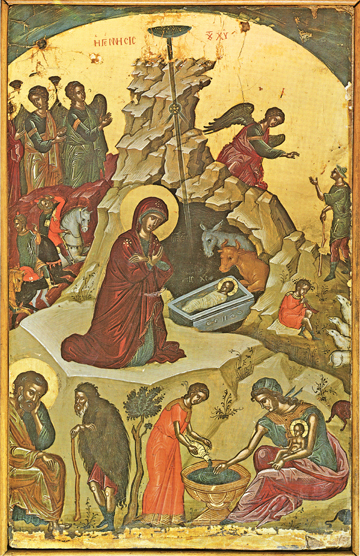
All icons, unless noted, by permission of St Isaac’s Skete: skete.com
from “Orthodox Chants”
The Magi
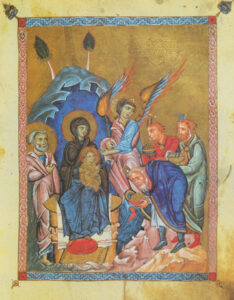
It’s no secret that we Orthodox are always ahead of the game! With us Orthodox the Magi are already here – in our Gospel reading for Christmas Day Divine Liturgy: Matthew 2:2-12. Some others, who shall remain nameless, will have to wait another twelve days, till the feast of the Epiphany, for them to arrive. (I suppose this makes some sense: it would take them a while to make the trip from Bethlehem west to Rome…?) * Actually, to be serious, there were historical reasons why the difference in timing developed – but let’s not go there now.
- That is, unless we go Orthodox Old Calendar, when Christmas doesn’t come till January 7 – and then the Magi have only 24 hours to hurry back east. Oh, help.
Magicians?
“Now when Jesus was born in Bethlehem, behold Magi came from the east…”
Matthew’s text says “Magi” from the Greek μάγοi / “magicians”. The King James Bible euphemized “Magi” into “Wise Men”, and many English translators have followed. Why? Probably because we have been taught that magic is evil. (Too bad, I guess, for the Magi who came to worship Jesus.)
Were they also “wise men”? Yes. Good kings and premiers and presidents have always kept wise intelligent men around to advise them – now including wise women, a great advance.
All early tradition says they came from Persia, modern-day Iran. The wise men of the court of Persia were Zoroastrian priests who practiced white magic, magic used for good purposes, as opposed to “black magic”. They were also astrologers who sought meaning in the movement of the planets, stars and constellations.
If you want, we can talk about magic and astrology some other time.
The Nativity Stories
Before we continue, let’s look at how Matthew’s account fits in here.
We have only two accounts of Jesus’ birth: Matthew and Luke.
Luke tells us twice that his Nativity stories came directly from the Virgin Mary. 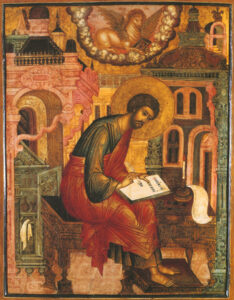 Tradition says he interviewed her. He describes how she remembered that the Angel Gabriel had announced her divine Motherhood, and her visit to her cousin Elizabeth, and that an angel appeared to shepherds and told them to go and see the newborn Child in Bethlehem – and more.
Tradition says he interviewed her. He describes how she remembered that the Angel Gabriel had announced her divine Motherhood, and her visit to her cousin Elizabeth, and that an angel appeared to shepherds and told them to go and see the newborn Child in Bethlehem – and more.
Saint Matthew’s 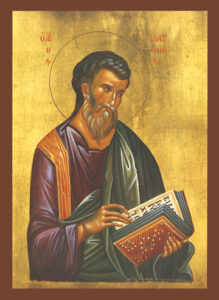 account obviously came from Joseph: how he had reacted to her pregnancy, till an angel commanded him to believe her and “take her to yourself” . Matthew alone has the story of the Magi, after which Joseph was instructed by an angel to lead the Holy Family down into Egypt, then back home when Herod was dead. How did Matthew get this information? Tradition say that by the time of his writing Joseph was long dead. Perhaps it came from Joseph’s family. James seems a likely candidate.
account obviously came from Joseph: how he had reacted to her pregnancy, till an angel commanded him to believe her and “take her to yourself” . Matthew alone has the story of the Magi, after which Joseph was instructed by an angel to lead the Holy Family down into Egypt, then back home when Herod was dead. How did Matthew get this information? Tradition say that by the time of his writing Joseph was long dead. Perhaps it came from Joseph’s family. James seems a likely candidate.
Luke and Matthew agree about the essentials: Jesus was Son of God born of Mary, born in Bethlehem. Otherwise they give two different accounts, with one minor disagreement.
Problem? No. Why Matthew alone has the Magi, while Luke alone has the shepherds – that we don’t know. But the accounts are easily harmonized except (I think) about what happened right after Jesus’ birth. Yesterday I read someone’s claim that this proves that the stories were invented and that Jesus if he ever existed certainly wasn’t born in Bethlehem and so on. Balderdash! The differences suggest perhaps that 1) there are facts here we don’t know about, or 2) Matthew and Luke were fallible human beings, and one of them got something confused. And definitely that 3) the stories are genuine. Anytime witnesses give precisely the same account of an event, that’s evidence that they got together and “cooked up” the story!
My point: If you come across people who try to deny the Nativity stories, don’t waste your time. Be sensible. Listen to Saint Luke and the Virgin Mary, Saint Matthew and Saint Joseph.
Now to the subject at hand.
The Visit of The Magi
First, let’s try to be rid of some popular confusions. Let’s begin with the easy part. What about the popular carol “We three Kings of Orient are”. Is that accurate?
Were they Kings? No. This was a later legend in the West, probably deriving from Isaiah 60:1–6, which refers to “kings [coming] to the brightness of your dawn” bearing “gold and frankincense”. But in the Gospel account they are not called “kings”, nor is there any ancient 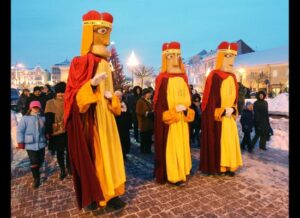 tradition to that effect. No matter, the Epiphany, retitled “Three Kings Day” left, has become the great Nativity celebration in Spanish-speaking countries.
tradition to that effect. No matter, the Epiphany, retitled “Three Kings Day” left, has become the great Nativity celebration in Spanish-speaking countries.
Were there three? Probably. Western art and Orthodox icons always picture three Magi, but Matthew mentions only the three gifts to the Christ Child.
P.S. written five days later. I just read that Syrian tradition says there were twelve Magi!
From the Orient? Actually, yes. “Orient” originally meant only “east” – not the Far East.
Did the Magi ride on camels? Extremely unlikely. below: beautiful but wrong  Have you ever ridden a camel? Would you choose to ride 1000 miles from Persia to the Holy Land on the back of a camel? People of means did not ride them. Camels were beasts of burden. Somewhere I saw an icon showing them arriving on horseback.
Have you ever ridden a camel? Would you choose to ride 1000 miles from Persia to the Holy Land on the back of a camel? People of means did not ride them. Camels were beasts of burden. Somewhere I saw an icon showing them arriving on horseback.
Do we know their names? No. By Medieval times in the West they had gained the names Balthasar, a king (wrong) from Arabia (wrong) or maybe Ethiopia (wrong); Melchior, a king (wrong) who came from Persia (right!); and Gaspar, a king (wrong) of India (wrong).
General principle: “The farther one gets from the original source, the odder things become.” This applies in many ways. Enough said?
The Magi in the Holy Land
We’ll look in a moment at the star, but let’s jump ahead now to their arrival in Jerusalem.
They went immediately to King Herod the Great, asking “Where is he who is born to be the king of the Jews? In the east, we have seen his star and have come to worship him.” Surely the King would know.
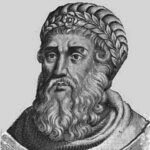 But King Herod did not know. King Herod was a rat. He pretended to be King of the Jews, but in fact he was a lackey of the Roman emperor. At this time he was building a magnificent new temple to impress the populace; but he was irreligious. He didn’t even know what all good Jews knew: where the Messiah was to be born. So he had to ask his own wise men, who quoted the prophecy from Micah 5:2: “But you, O Bethlehem Ephratah, though you are small among the clans of Judah, out of you will come for Me One who will be ruler over Israel, whose origins are from of old, from ancient times.”
But King Herod did not know. King Herod was a rat. He pretended to be King of the Jews, but in fact he was a lackey of the Roman emperor. At this time he was building a magnificent new temple to impress the populace; but he was irreligious. He didn’t even know what all good Jews knew: where the Messiah was to be born. So he had to ask his own wise men, who quoted the prophecy from Micah 5:2: “But you, O Bethlehem Ephratah, though you are small among the clans of Judah, out of you will come for Me One who will be ruler over Israel, whose origins are from of old, from ancient times.”
No, King Herod was a super-rat. Some accounts say much was accomplished under his rule. If so, that was because he was able to concentrate on ruling. If he feared that any might even potentially challenge him, he quickly had them executed. He had most of his family murdered, even some of his children, before they could get any “ideas”. Finally he had his wife killed. They said he lost his mind after that, for he had loved her… but, I mean, 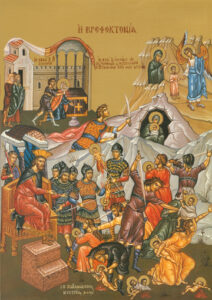 what else could he do?
what else could he do?
And now here was another threat, a competing king of some sort. So Herod directed them to Bethlehem – and no doubt sent his men to follow and spy out where this new king was. When they couldn’t find him, Herod was forced to take the only sensible choice: he ordered the slaughter of all boy babies in Bethlehem and in all the surrounding region two years old and under, “according to the time he had been told by the Magi”. (They must have been on the road for two years.) Each year on December 29 the Church commemorates The Innocent Child Martyrs of Bethlehem.
Did the Magi arrive in Bethlehem on Christmas night? Christmas cards and paintings and even our Orthodox icons suggest that. However, one word in Matthew’s text hints otherwise. Matthew says they found the Holy Family not 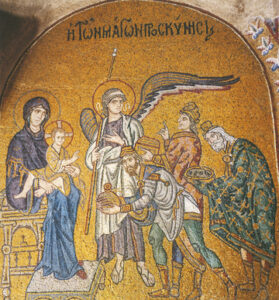 in the cave (let alone in a stable – that was a later Western invention) but in a “house”. εἰς τὴν οἰκίαν means “in the house”. That makes it sound as if they arrived later. How long did the Holy Family remain in Bethlehem? Luke says they were in Jerusalem for Jesus’ circumcision and naming on his fortieth day. Surely Herod’s men would have come after the Boy before that. Matthew suggests they went directly from Bethlehem to Egypt. This is where the two accounts seem hard to harmonize.
in the cave (let alone in a stable – that was a later Western invention) but in a “house”. εἰς τὴν οἰκίαν means “in the house”. That makes it sound as if they arrived later. How long did the Holy Family remain in Bethlehem? Luke says they were in Jerusalem for Jesus’ circumcision and naming on his fortieth day. Surely Herod’s men would have come after the Boy before that. Matthew suggests they went directly from Bethlehem to Egypt. This is where the two accounts seem hard to harmonize.
Back to the Magi: The three gifts were symbolic: Gold the gift for royalty, Frankincense offered to a divinity (as we still do at every Orthodox service), Myrrh for anointing the dead. 33 years later the Myrrhbearing Women would bring myrrh to His tomb. God the King who came to die. How did they know that? How ever did they know?
And then they were gone. Warned in a dream the Magi did not report back to Herod but “returned to their own country another way”. Or did they never get home? I read long ago (I forget where) that near 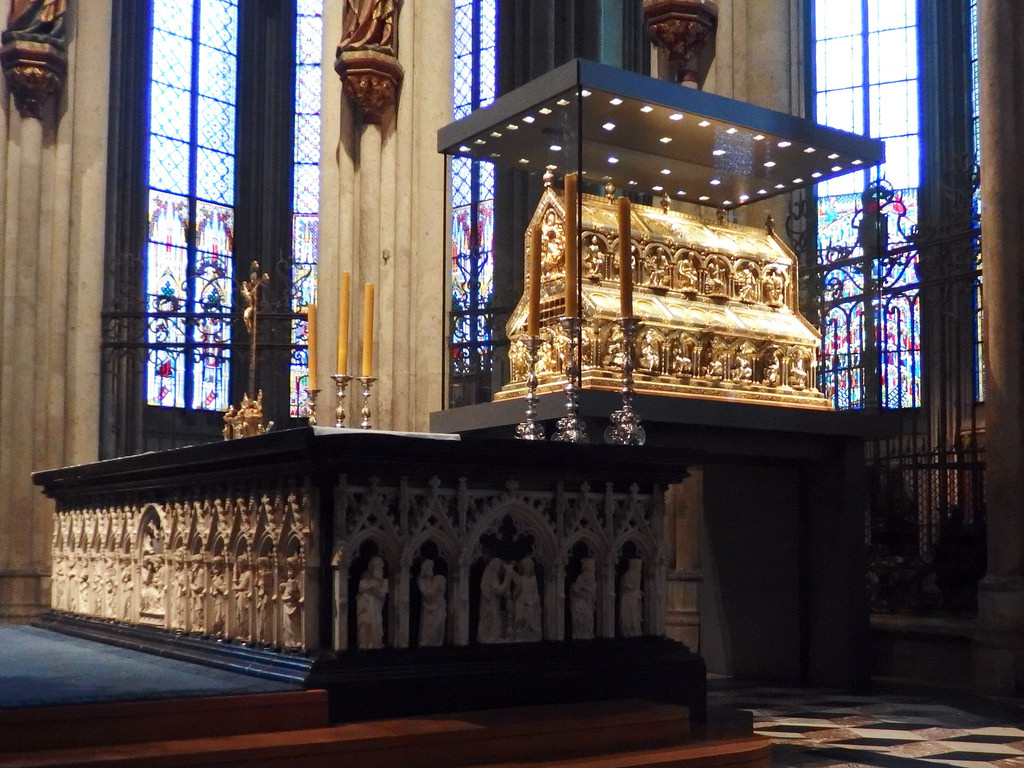 Edessa, on the border between Syria and Iraq is an old monument with a faded inscription: “The Tomb of the Wise Men”. However, it’s said their relics were in Milan for a while and are now in the cathedral in Cologne, Germany, right of all places, where many today come to venerate them – as certainly these Magicians should be venerated.
Edessa, on the border between Syria and Iraq is an old monument with a faded inscription: “The Tomb of the Wise Men”. However, it’s said their relics were in Milan for a while and are now in the cathedral in Cologne, Germany, right of all places, where many today come to venerate them – as certainly these Magicians should be venerated.
above: from “The Catholic Company”
The Star
Matthew doesn’t explain the star.
The ancients weren’t fools. They knew the ordinary patterns of the sky better than we, who are surrounded by artificial light and rarely look up. And when there were sudden bright nocturnal phenomena (supernovas for example), Chinese astronomers especially recorded what happened.
So one possibility is that it was a supernatural phenomenon visible only to the Magi, since the ancients noted nothing extraodinarily remarkable like this at the time. I read that the Orthodox teaching definitely is that the star was supernatural, because some icons show it with rays shining down on the cave.
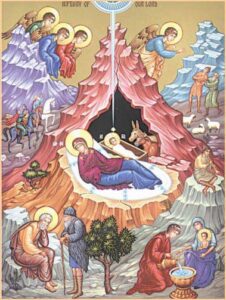
However, the Nativity (and other) icons also show bizarre, impossible rock formations, intended only to convey that what is portrayed is a supernatural event. Can this also apply to the Nativity “star”? For myself, I believe the “star” shining a ray on the cave may be considered a “tradition” rather than The Tradition of the Church.
from the Greek Orthodox Archdiocese
For myself, I think the “star” was a natural occurrence with super-natural implications, that this has a more profound meaning – and it would explain why it took Astrologers to understand what it meant.
Three planets: Jupiter (the king), Mars (god of war and conflict), and Saturn (seen by the Jews as their protector) were in conjunction, in and out, from 7 BC to 5 BC. Just to make it more remarkable, there were two brilliant comets during those years.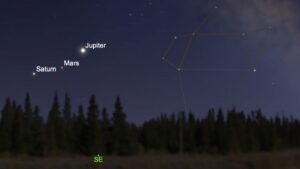
from space.com
This year’s conjunction of Jupiter and Saturn, when the two of them shone almost as one “star” has created a stir. * Consider how much excitement that continuing triple conjunction must have caused 2000 years ago.
- My wife and I went to the top of a nearby hill to see it. Wisconsin’s usual cloudy December sky suddenly cleared, and there it was!
Is the dating of the conjunction from 4 BC to 6 BC a problem? No. Scholars believe the monk Dionysius Exiguus, who in the Sixth Century calculated the year of Jesus’ birth, was off by about five years. So likewise are our years AD and BC. *
- Does this mean we’re long past the dismal year 2020? or is it yet to come, maybe to redeem itself!? Does this mean we’re all five years older than we think we are? five years younger? I’m sorry I led us all down this path! Forgive me. All my Christmas chocolate makes me giddy.
Back to the story.
Matthew doesn’t explain how the Magi knew the meaning of the star. If it was a supernatural phenomenon, they must have discovered it either by direction revelation or by some “esoteric, magical” means known to white magicians.
However, the conjunction would have told them clearly: 1 Jupiter, King of the gods. 2 Mars, god of war, great conflict. 3 Saturn, whom the Jews considered their protector. Combine this with the Jewish hope for an imminent Messiah, which was known in the “orient” ever since the Jews had been held captive in Babylon. (Indeed it was Cyrus king of Persia who conquered Babylon and freed the Jews to return home.)Thus these Astrologers would understand and know that the time had come.
But what caused them to make this difficult journey which would take years out of their lives? That we do not know – but somehow they must have felt compelled to do it..
Why did the star (and comets) lead them to the west? That’s easy. Because all things in the sky move from east to west!
Matthew says when they came to Bethlehem, the star stood “over the place where the young Child was”. I wonder: did the comet or the conjunction or whatever it was come to the zenith at that point and shine in the sky directly above Bethlehem? Perhaps.
Or perhaps it was a miraculous supernatural phenomenon.
Here is why I find more meaning in the theory of the conjunction of the planets. I like the thought that God from the beginning of Creation had designed the cosmos for this moment, so that “when the time had been fulfilled”, even the planets in their courses would proclaim the birth of their Creator, and even Gentiles would know that Jesus the King of the Jews and Lord of All had come.
Jesus Christ, our Lord and our God, the “Dayspring from on High”, “the Light that knows no evening”, “whose Kingdom will have no end”.
Orthodox Christian Chants
Next Week January 8: JESUS – for the feast of the Naming of the Lord
Week after Next: So you won’t have to think about it (and a week late – sorry), I will give you a New Year’s Resolution
I believe St. John Chrysostom thought the star was a special creation. Correct me if I am wrong. I do not know if it was natural or special creation, but it worked either way. Sometime I would like to hear about magic, because some in our modern culture think there is nothing wrong with it, while the Old Testament law says is is a definite no-no.
Καλὰ Χριστούγεννα!
και Ευτυχισμένο το Νέο Έτος
I hadn’t read John Chrysostom on the subject, so I found one of his Nativity sermons. I think what he meant by a special creation is what I meant by “supernatural phenomenon”. God creates all things, and I meant something not in line with His usual “natural” order of things. I hate to question such an august Father, but if it was truly something brilliant in the heavens, then I don’t understand why no one else remarked about it, why only the Magi appear to have seen it.